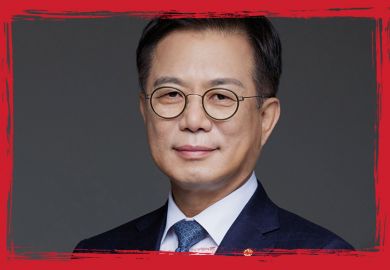Browse the full list of the world's top-ranked universities in 2016-2017
Current global crises imperil exactly the kinds of progress higher education has helped to create. Higher education must contribute now like never before. But the sector must get its own house in order and do a better job of conveying its transformative potential.
To contribute best, what big challenges must higher education confront over the next five years?
Research grows geopolitical
First, let us consider research, which I believe will further crystallise around geopolitical lines in step with wider global shifts. Serious research kit blows the budget of many countries. Large questions need big teams sharing diverse perspectives and advanced expertise. Nations will tighten investments around strategic interests, strengthening transnational networks that garner required capability. This puts new heat on every researcher to demonstrate not just the activity or quality of their work but its broader public impact. It demands fresh courage from universities to invest in basic fields that yield long-run returns. We need reports that celebrate the value of such “slow leadership”. The Organisation for Economic Cooperation and Development’s new system benchmarking initiative could play a role.
National competition for students
At the same time, competition between nations over education will intensify. As economies mature, both higher education and the professional workforce that it forms will become more significant. Countries will compete not just to recruit the most promising students but also to retain the most successful graduates. They will entice the most talented people through targeted incentives, creating new student flows and diasporas. Countries are searching for differentiating means for demonstrating the value returned from studying and working with them. This is signalled by work on learning gains and teaching excellence in the United Kingdom, by ROI (return on investment) calculators in the US, and by outcomes assessments unfolding across Europe, Asia and South America.
Clarifying value
The public will ask more about the value of higher education. Is higher education worth the cost, time and effort? More deeply, does it improve people, make them better citizens, create a more open and scientific society? Does academic research serve as a catalyst for innovative change? Tonnes of research makes clear that higher education creates enormous value. Articulating this contribution to people who don’t know or perhaps don’t care about higher education has been difficult. New conversations are required that help people to see how higher education can help them succeed. The stories that higher education tells a more interested public are essential. Rather than talk about their own immaculate histories, the sector must engage people and communities in imagining their own future options.
Transparency on education
A big part of demonstrating value hinges on better information about education. Information on research reputation muddles thinking about education activity, quality and impact. Markets get distorted, individual futures are compromised, quality itself degrades. Globally, less than 5 per cent of institutions are serious research players. Reports clarifying what students know and can do are sorely needed. Although politically vexed, the OECD’s Assessment of Higher Education Learning Outcomes proved what it is feasible to achieve, paving the way for myriad ambitious initiatives unfolding today. Changes in markets, institutions and technologies are spurring changes in assessment of the sort that have already revolutionised curriculum and teaching. Information on education outcomes will become more widely available, revolutionising discourse about what higher education contributes.
Claim a free copy of the World University Rankings 2016-2017 digital supplement
Commercialising core business
Core education and research business is changing, in turn changing institutions. Many traditional academic approaches were never designed for the kinds of provision apparent today. Scaling them can be expensive and risky. Instead, savvy designers are creating novel architectures that offer viable quality at scale. Universities are partnering with commercial firms to co-source and outsource core teaching work. Research is shifting into specialised units. New business models are given life in these changes, as are the new institutions that create and sustain them. While typically tinged with commercial intent, institutions must be clear about the corporate changes under way.
21st-century academic work
Such reforms impel changes in academic work, roles and workforces. New forms of education, research and engagement are seeding new and more specialised forms of work. Changing academic work is creating new kinds of roles. Academics build expertise in niche areas rather than strive to be “superdemics” doing everything for everyone. Over time, wide-scale role changes reshape the workforce itself. Incumbents, however, will temper the pace of such change, not least as the baby boomers are retiring slowly. Even so, large-scale workforce renewal is under way in many countries. But hiring teachers on one-hour contracts is far from a sustainable solution. Much more must be done to make the sector an employer of choice that attracts the best talent.
Broadening leadership capability
New forms of leadership are required to embrace future challenges. Working up through academic and managerial ranks does not necessarily grow the capabilities needed to respond to mounting expectations of governments, fluctuating requirements of industries or diverse needs of communities. New formal and on-the-job training is required, as are new kinds of track record and recruitment. Leaders will benefit from the kind of commercial acumen gained through industry experience. Rather than spend a sabbatical at a similar university, more return may be procured from a secondment at an industry partner or government agency.
Co-creating new contributions
This brief survey is only the start of it. New system architectures and forms of governance are taking shape. Funding reform is a huge issue to address, which leads quickly to questions about the cost of teaching and research, and sensitive matters around cross-subsidisations and executive incentives. Much must be done to create more sustainable and equitable societies, looking at disadvantaged groups and also across generations. Higher education will keeping swinging East as Asian institutions mature, revealing new academic cultures, alignments and disparities. Accreditation agencies must ensure compliance with clear standards to sustain sector legitimacy. At the same time, ministries are seeing new limits to their power, and instead the need to co-create policies with the communities they represent.
Transparency a linchpin to success
Like never before, the world needs higher education to help work through meltdowns and create better futures. To engage best, institutions also need to address their own challenges and take leadership over communicating the value they create. As higher education transforms, effective leadership in terms of transparency will play an important role in making good with the future.
Hamish Coates
Professor of higher education, University of Melbourne. His book, The Market for Learning, is due for release later this year
POSTSCRIPT:
Print headline: Future-proof
Register to continue
Why register?
- Registration is free and only takes a moment
- Once registered, you can read 3 articles a month
- Sign up for our newsletter
Subscribe
Or subscribe for unlimited access to:
- Unlimited access to news, views, insights & reviews
- Digital editions
- Digital access to THE’s university and college rankings analysis
Already registered or a current subscriber? Login








